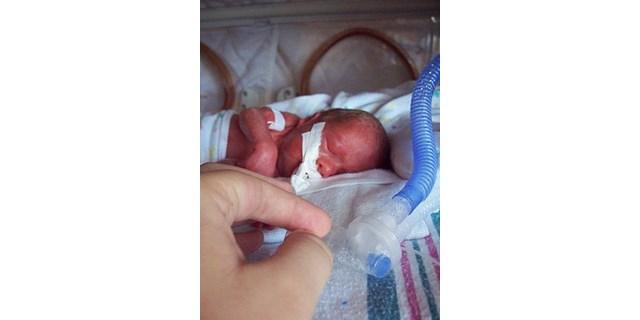
Embrace is a new cost-effective infant warmer, which targets bottom-of-the-pyramid families that have premature babies or those with low birth weights. The warmer was developed by Jane Chen, a Stanford Business School graduate who had taken a course called Entrepreneurial Design for Extreme Affordability. During that course, Chen and her team realized that an inexpensive incubator was not a solution for families living without a consistent electricity supply that could keep the incubator running. Embrace is therefore a small sleeping bag with a wax-filled heating pad, which takes 25 minutes to heat up with hot water and stays warm for four to six hours. The warmer is currently being sold to doctors, local hospitals in developing countries, including India, and NGOs.
A mother living in a rural village outside of Bangalore, India gives birth to a baby two months prematurely. Her family cannot afford to go to the city hospital in Bangalore, so her husband, who raises silkworms that he warms under lamps, decides to care for the baby in the same way. A few day later, their baby dies.
Stopping this tragedy — there are 20 million low birth weight and premature babies born each year — is the primary mission of Embrace. As its co-founder and CEO, Jane Chen, told me in June 9 interview; she started Embrace three years ago after helping build an organization to educate the orphans of parents who contracted HIV/AIDS in China.
In the early 1990s, the Chinese government had a policy of injecting red blood cells pooled from blood donors back into their systems. The government thought that this injection would enable the donors to give blood again more quickly. Instead, the practice brought HIV/AIDS to 60% to 80% of those unwitting donors, and Chen helped run an organization to educate their children, most of whom were not HIV positive.
This experience — and her work on HIV/AIDS with the Clinton Foundation — convinced her that by taking small steps, she could make a positive difference. While getting her MBA at Stanford, Chen took a course called Entrepreneurial Design for Extreme Affordability. Her team’s assignment was to develop a baby warmer that would be affordable for the caregivers of low birth weight and premature babies born to families at the “bottom of the pyramid.”
Chen learned that creating an inexpensive incubator was not the right solution. That’s because people living, say, 400 miles from Bangalore, do not have enough electricity to keep an incubator running and the people who take care of babies there lack the technical skill to keep those incubators running properly.
So Chen developed a different approach. Her Embrace team developed a small sleeping bag with an interior pouch for a wax-filled heating pad. The pad contains phase-changing-wax-like material that melts at about 37 degrees Celsius — human body temperature — and stays at this exact temperature for four to six hours. It takes about 25 minutes to heat the pouch with an electric or hot water heater.
Unlike traditional incubators that cost as much as $20,000, the Embrace Infant Warmer’s price is ”less than 1% of that price.” And, according to Chen, it can work without constant electricity, has no moving parts, is portable and is safe and intuitive to use.
Thanks to its compelling mission of saving babies, Embrace has attracted extraordinary talent. Its 25 people include a PhD in Electrical Engineering who is an expert on fiber optics, an aerospace engineer, and a computer scientist with a string of entrepreneurial successes in his wake. And over the next year, Embrace intends to hire 25 more people in engineering, quality assurance, manufacturing, sales and marketing.
While Embrace’s mission of saving babies is powerful, it needs capital to manufacture and distribute the Embrace Infant Warmer. Embrace generates some of that capital by selling the product — to doctors at local clinics and to governments and non-governmental organizations (NGOs) — and by renting it to parents. As a 501(c) (3), Embrace has also raised funds from foundations and individual donors.
Five years from now, Chen hopes Embrace will have gone further to achieve her vision of empowering the disadvantaged through disruptive technology. She wants Embrace to deliver health care innovation to the bottom of the pyramid in a sustainable way.
